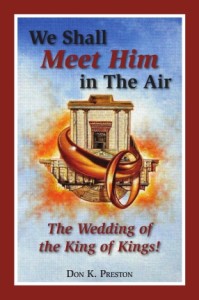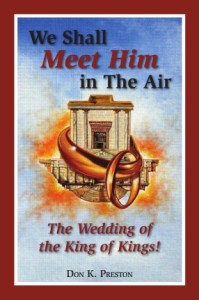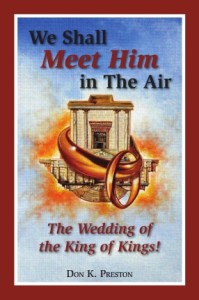My Analysis of Gary DeMar’s Article on 2 Thessalonians 1- #1

My Analysis of Gary DeMar’s Article on 2 Thessalonians 1 – #1
On October 28, 2020, I posted an excellent article by my friend Gary DeMar. His article was a response to Vern Poythress, who claims that 2 Thessalonians 1 is a second coming of Christ text.
Overall, I think that DeMar’s response is excellent– spot on! Except in some key and I might add, fatal to DeMar’s claimed futurism, points. First of all, let me take note of some of the points that DeMar makes that I think are solid, sound and correct.
DeMar argues that 2 Thessalonians 1 is not about a yet future event for the following reasons:
The temporal indicators that the personal pronouns of the text indicate. Paul was addressing a very specific historical situation, promising the Thessalonians– not some far distant generation of believers– relief from their then present circumstances. This is undeniable and should be honore by all exegetes. Unfortunately, most commentators, like Poythress, literally ignore this, or try to mitigate it.
The fact that the Thessalonians were being persecuted by the Jews when Paul wrote.
The fact that Paul promised those then living Thessalonians saints that the Lord would come and give them relief from that persecution.
DeMar does a good job of showing that inter-textual references to 1 Thessalonians 2:15f and 2 Thessalonians 2 demands a first century fulfillment.
His correlation of Matthew 16:27-28 and Matthew 24:29f is very powerful and very effective, showing that what Paul was predicting in 2 Thessalonians 1 had to have been fulfilled in the first century.
DeMar shows that Paul’s citation of Isaiah 66:15f and the prediction of the Lord’s coming “in flaming fire” demands that he had the impending judgment of Jerusalem in mind.
All of these points, and DeMar makes even more good points on 2 Thessalonians 1, are excellent, valid and true. However, I suggest that DeMar’s own hermeneutic falsifies his futurist application for another key text in the Thessalonian epistles, and that is 1 Thessalonians 4.
Now, DeMar believes that in 1 Thessalonians 4 Paul is discussing a yet future, “end of human history” coming of the Lord. He is thus positing an imminent coming of the Lord in 2 Thessalonians 1 & 2 and a protracted, non-imminent coming of Christ in 1 Thessalonians 4. Is this a tenable, defensible, position? No.
We have a right to ask, what is there about 1 Thessalonians 4 that sets it off from the other eschatological passages in the Thessalonian epistles. What makes them references to an imminent coming, while 1 Thessalonians must refer to a distant event? DeMar never tells us, and in fairness, that was not the goal of his article. But the questions are valid nonetheless. You would think that if there is such a clear demarcation between two radically different comings that DeMar not only could, but would offer them to us. But he never tried.
Let’s apply DeMar’s good, solid hermeneutic that he uses in the other passages, to the text of 1 Thessalonians 4.
Does Paul use the personal pronouns that would demand that we honor audience relevance that DeMar says we must honor, would suggest, even demand that Paul expected the coming of the Lord in chapter 4 to be in the lifetime of the first century Thessalonians? He certainly did!
Note first of all that Paul said: “I would not have you to be ignorant brethren…” Clearly, he was writing to the Thessalonians. Not the modern church. He was not discussing a timeless, far removed situation. Just as in 2 Thessalonians 1 he was addressing a very real historical situation that was taking place when he wrote and about which they had asked him.
In addition, as virtually all commentators agree, the Thessalonians were upset that some of their brethren had died before the Lord came. Now, if Paul was speaking of a far distant coming of the Lord, why didn’t he remind them that he had warned them that the parousia might not be for 2000 years or more? The truth is that Paul did not correct their expectation of an imminent coming. He just told them that their loved ones would not miss out on the blessings to be brought at the Lord’s coming. Why don’t we find Paul reminding the Thessalonians that there was to be a parousia of the Lord in AD 70 (2 Thessalonians 2, per DeMar) but then, there is to be another parousia of the Lord at the end of time? The reality is that we do not find any such a distinction anywhere in the Thessalonian epistles. There is no temporal disconnect, no correction of an imminent expectation. Paul did mention parousias, plural. He knew of one parousia, and it was imminent, as DeMar affirms of 2 Thessalonians 2.
Side Bar: If it is true, as many noted commentators claim, that the brethren of the Thessalonians had been killed (martyred) in the persecution from the Jews (as I argue in my book, We Shall Meet Him In The Air: The Wedding of the King of kings), this connection demands that 1 Thessalonians 4 and 2 Thessalonians 1 are directly parallel.

So, if in 1 Thessalonians 4 and 2 Thessalonians 1 & 2 address the same identical historical situation and essentially the same promises, although with different nuances, then it is implausible and inconsistent to acknowledge that 2 Thessalonans 1 is about the Lord’s coming in AD 70, and yet, 1 Thessalonians 4 is something radically different. Without the proof of such a dichotomization DeMar’s futurism is falsified. Thus, the real question that presses in on us, and should press in on Gary Demar is how to indisputably prove that Paul had two radically different comings of the Lord in 1 Thessalonians 4 and 2 Thessalonians 1 & 2. DeMar makes not a single attempt to justify that distinction in his article.
Consider this: if the Thessalonians were so distraught over the death of their loved ones prior to the parousia, believing that the Lord’s coming was so imminent, where might they have gotten the idea that the Lord’s coming was truly imminent? Well, based on DeMar’s own (excellent) analysis in his response to Poythress, they would have gotten that idea directly from Paul! So, once again, where does Paul correct their expectation of the imminent coming of the Lord? And to reiterate an earlier point, if they were so distraught that their loves ones had died before the Lord came, and yet, Paul had instructed them that the Lord’s “real” coming might not be for thousands of years, why did he not remind them of that teaching concerning a protracted parousia? After all, in 1 Thessalonians 3 and in 2 Thessalonians 2, Paul did correct misunderstandings on the part of the Thessalonians, but in 1 Thessalonians 4, there is no such corrective.
Keep in mind that in 2 Thessalonians 2, which DeMar applies to AD 70, Paul addresses the confusion of some that “the day of the Lord has already come” (2 Thessalonians 2:1-2). Paul reminds them that he had told them that certain things had to happen before the parousia, but, this is where DeMar’s hermeneutic entraps him, DeMar recognizes that those preliminary events were taking place already in the first century– the apostasy, the Man of Sin was already alive, etc.– and although they were necessary preliminaries to the Lord’s coming, that coming was to be in AD 70!
Do we find any such temporal corrective in 1 Thessalonians 4? Not a word! So, if Paul predicted that the Lord’s parousia- (and the word parousia is used in 2 Thessalonians 2 as well as in 1 Thessalonians 4), but that certain things had to happen first, yet, that parousia was to still be in the first century, it seems to me that we are on solid ground to expect (demand) to find some temporal correctives in 1 Thessalonians 4. Yet, to reiterate, we find not a syllable. Instead, we find Paul affirming that the parousia would be in the first century!
Notice 1 Thessalonians 4:15-17:
For this we say to you by the word of the Lord, that we who are alive and remain until the coming of the Lord will by no means precede those who are asleep. For the Lord Himself will descend from heaven with a shout, with the voice of an archangel, and with the trumpet of God. And the dead in Christ will rise first. Then we who are alive and remain shall be caught up together with them in the clouds to meet the Lord in the air. And thus we shall always be with the Lord.
Question: Was Paul’s reference to “you” speaking to the same “you” as in 2 Thessalonians 1? Of course. That being true, that means that audience relevance must be honored.
Was Paul’s two fold reference to: “We who are alive” a reference to himself and the living Thessalonians? (Paul uses the present participles to speak of “the living.” Keep in mind that he does not simply speak of “the living ones” but, “we who are alive and we the ones living “until the parousia” (εἰς τὴνπαρουσίαν). Now, if Paul was referring to some far distant generation, would his language not have been “those who are alive and remain until the parousia”?
There is nothing in the linguistics, the grammar, the context of 1 Thessalonians 4 to suggest that Paul had some far distant parousia in mind. Any “natural” reading of the text shows that he was speaking of his then current generation, and that generation living until the parousia.
Keep in mind that DeMar conflates Matthew 16:27, along with Matthew 24:29-34 with 2 Thessalonians 1, to prove the first century parousia. Well, one has but to notice the parallels between Matthew 16:27-28 with 1 Thessalonians 4, to realize they both texts speak of the same time and the same event, the AD 70 coming of the Lord.
In Matthew 16:27-28 we find the coming of the Lord, with the angels, in judgment and to reward, and it was to be in the first century. (It was also to be the time of the vindication of Jesus’ suffering and that of his apostles, v. 21-28).
In 1 Thessalonians 4, we have the coming of the Lord, with the angels, in judgment and reward, in the lifetime of the first century church. Where is the distinction? It is not there. And since there is no distinction given, implied, or suggested, we are on very safe ground in saying that the parousia of 1 Thessalonians 4 s the same coming of the Lord in Matthew 26:27-28, which Gary DeMar rightly places at AD 70.
This will conclude part #1 of our analysis of Gary DeMar’s (excellent) response to Norm Poythress. I think the reader can see that DeMar’s response is a fine example of solid hermeneutic, sound logic, excellent exegesis. I am also convinced that the reader can see that Gary DeMar has– by his own analysis– destroyed his own futurist eschatology. But there is more, so stay tuned!
In the meantime, get a copy of my book, We Shall Meet Him In The Air: The Wedding of the King of kings, for an in-depth discussion of the many direct parallels between the Olivet Discourse and Paul’s Thessalonian epistles. These direct parallels – over 20 of them– prove that Paul had only one parousia in mind, and that was the Lord’s imminent coming of AD 70.

Hits: 8
The post My Analysis of Gary DeMar’s Article on 2 Thessalonians 1- #1 first appeared on DonKPreston.com.
My Analysis of Gary DeMar’s Article on 2 Thessalonians 1- #1